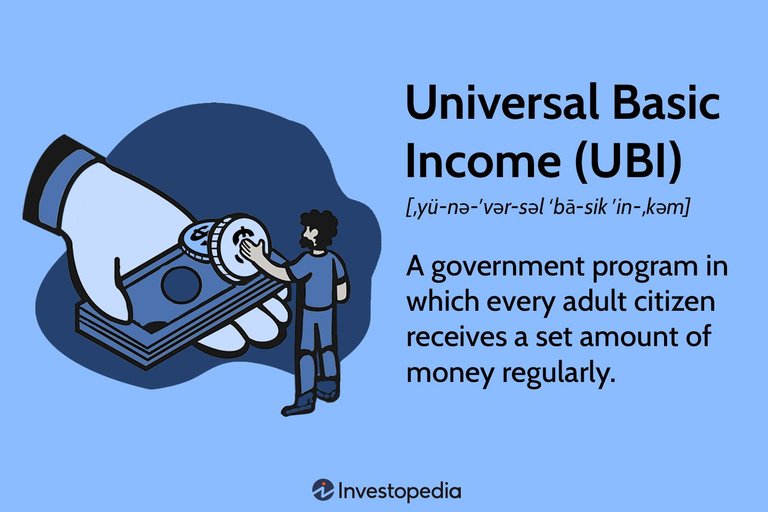
Investopedia / Sydney Saporito
I had never heard of a proposal for a universal basic dividend (or income) until recently. Overall, I am not completely sure of the idea and am left with more questions than answers. Though I can see both the positive and negative aspects of the concept, it would just be so different from what America is doing now. I may be hesitant only because of such a change it could bring. The whole idea of a universal basic dividend is interesting and sounds amazing for citizens, but could it be too good to be true?
Dr. Steve Trost talks about Alaska and Venezuela when discussing the management of oil reserves in his lecture titled “The Libertarian, Conservative, Progressive, Communist (Not Socialist) Case for a Universal Basic Dividend”. Alaska, being a part of America is not socialist, but Venezuela is. Because of this, Venezuela took control of all oil companies in the country which has led to no outside investment in years. Alaska, on the other hand, has its oil reserves under private control and thus some of the revenues from the oil are distributed to residents. This is done through the Alaska Permanent Fund. Since the state is functioning like this, we can see an example of what a universal basic dividend would look like. However, because this dividend is not on a larger scale, and thus can’t pay for all basic needs, it isn’t the best example. To really sell the idea, it would be nice to see a real-life example of a country that has done this and has functioned successfully for a somewhat long period. Some countries have tried the idea of universal basic income out, but none have fully implemented it so far. For example, Kenya has given monthly payments of about 0.75 cents a day to citizens for about nine years. The money comes from a United States based charity called GiveDirectly. Though this doesn’t seem like much, I’m sure it is a great amount to those citizens in Kenya since it is a very poor country. Like with Alaska, this does not seem like a good example of what universal basic income would look like in the U.S. either since the money comes from a charity in a different country. Along with this, it is also not a long-term universal basic income.
One of my larger concerns is the elimination of all minimum wage restrictions. I love the idea of getting paid based on your skill level, but I’m uncertain how that would be determined and regulated. For example, let’s say I have never worked at McDonalds before. They could decide to hire me for $1.50/hour, and they could hold me at this pay claiming my skills never improved. This, to me, would be taking advantage of the situation. So, without harsh regulation of the elimination of minimum wage, companies (especially large companies) could take advantage of this and use employees to gain more money. Another aspect of this is that if I am, personally, hired for $1.50 an hour, I will definitely lose the incentive to work. With the price of living constantly going up, would the universal basic dividend also trend upwards to meet this need? If not, individuals would still need a job to make ends meet and thus, I feel that the minimum wage requirement would still need to be in place. So overall, on this specific topic, I’m not sure if I just didn’t understand this part of the plan well or if I just didn’t agree with it.
One of the things I fully support when it comes to a proposal for a universal basic dividend is more money for retired or retirement age individuals. These individuals often have more health issues than an average citizen. Sometimes their retirement and social security is not enough to pay for medicine and/or doctor bills. Many elderly people find themselves having to go back to work to pay for expenses, so I think this supplemental money would be very beneficial to the elderly. This could also be an incentive for retirement age individuals to put away savings for their funerals to lessen their families’ burdens (though that sounds terrible) since they could potentially have an “excess” of money.
I also think the extra money would be beneficial for larger families since the cost of living is high, however I do agree with the argument that this would encourage couples to have many kids. This could potentially cause another baby boom. The baby boom, which occurred around the 1940s – 1950s, has had effects on our country such as the housing demand being high and job opportunities declining as those babies grew up. A lack of resources could be another negative effect of a baby boom. Another problem associated with the potential rise in childbirths could be a rise in child abuse. I could see this happening since some of these hypothetical children would probably be unwanted.
Overall, there are some things I fully support and agree with when talking about a universal basic income/dividend, but there are too many things I am uncertain about. One thing I mentioned earlier that I support is the additional money elderly citizens and citizens with large families would get. Some of the things, which I mentioned earlier, that I don’t support/ am unsure of are the elimination of minimum wage and the potential surge of large families in the US. It could be an excellent plan if executed correctly, but as of now, I am overall just unsure about it.